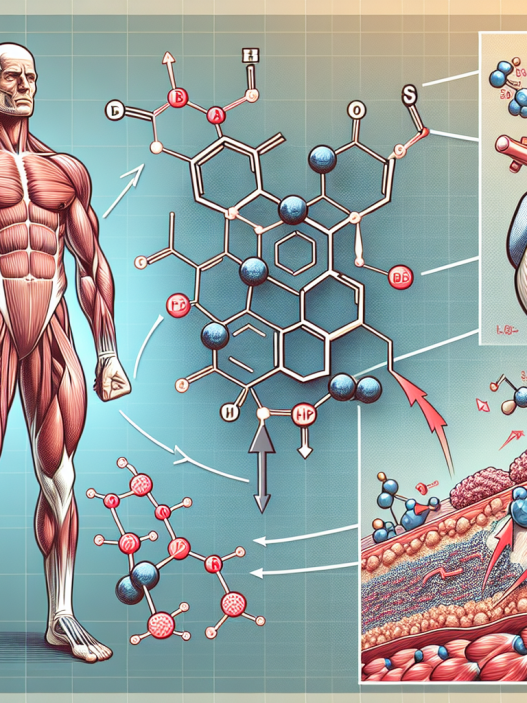-
Table of Contents
The Pros and Cons of Testosterone Undecanoate in Sports
Testosterone is a naturally occurring hormone in the human body that plays a crucial role in the development and maintenance of male characteristics. In recent years, testosterone has gained attention in the world of sports due to its potential performance-enhancing effects. One form of testosterone, known as testosterone undecanoate, has become increasingly popular among athletes. However, like any other substance, it has its pros and cons when it comes to its use in sports. In this article, we will explore the pharmacokinetics and pharmacodynamics of testosterone undecanoate and discuss its potential benefits and drawbacks in the world of sports.
Pharmacokinetics of Testosterone Undecanoate
Testosterone undecanoate is an ester of testosterone, meaning it is a modified form of the hormone that is designed to have a longer duration of action in the body. It is typically administered via intramuscular injection and is slowly released into the bloodstream over a period of several weeks. This slow release allows for a more stable and sustained level of testosterone in the body, compared to other forms of testosterone that have a shorter half-life.
According to a study by Nieschlag et al. (2016), the pharmacokinetics of testosterone undecanoate are characterized by a slow absorption phase, followed by a plateau phase where the hormone levels remain relatively stable, and then a slow decline phase. The duration of action of testosterone undecanoate can vary depending on the individual’s metabolism and the dose administered, but it is generally reported to last for 10-14 weeks.
Pharmacodynamics of Testosterone Undecanoate
The pharmacodynamics of testosterone undecanoate are similar to other forms of testosterone. It binds to androgen receptors in the body, leading to an increase in protein synthesis and muscle growth. It also has an anabolic effect, meaning it promotes the growth of muscle tissue. Additionally, testosterone undecanoate can increase red blood cell production, which can improve oxygen delivery to muscles and enhance endurance.
However, it is important to note that the effects of testosterone undecanoate are not limited to muscle growth and performance enhancement. It can also have significant effects on other bodily functions, such as mood, libido, and bone density. These effects can be both positive and negative, depending on the individual and their specific needs.
Pros of Testosterone Undecanoate in Sports
One of the main advantages of testosterone undecanoate in sports is its ability to increase muscle mass and strength. This can be particularly beneficial for athletes who participate in strength-based sports, such as weightlifting or powerlifting. The slow-release nature of testosterone undecanoate also means that athletes can maintain a more stable level of the hormone in their body, avoiding the peaks and valleys that can occur with other forms of testosterone.
Another potential benefit of testosterone undecanoate is its ability to improve endurance. As mentioned earlier, it can increase red blood cell production, which can lead to better oxygen delivery to muscles. This can be advantageous for athletes who participate in endurance-based sports, such as long-distance running or cycling.
Furthermore, testosterone undecanoate has been shown to have a positive impact on bone density. This can be especially beneficial for athletes who are at risk of bone injuries, such as those who participate in contact sports like football or rugby. By increasing bone density, testosterone undecanoate can help prevent fractures and other bone-related injuries.
Cons of Testosterone Undecanoate in Sports
While there are potential benefits to using testosterone undecanoate in sports, there are also some drawbacks that athletes should be aware of. One of the main concerns is the potential for abuse and misuse of the hormone. Testosterone undecanoate, like other forms of testosterone, is a banned substance in most sports organizations. Athletes who use it without a valid medical reason risk facing penalties and sanctions.
Another potential drawback of testosterone undecanoate is its impact on hormone levels in the body. As a synthetic form of testosterone, it can disrupt the body’s natural hormone balance, leading to side effects such as acne, hair loss, and changes in mood and behavior. These effects can be particularly concerning for female athletes, as testosterone undecanoate can cause virilization, or the development of male characteristics.
Moreover, the long duration of action of testosterone undecanoate can make it difficult to detect in drug tests. This can be a concern for athletes who are subject to regular testing, as they may unknowingly fail a drug test even if they have stopped using the hormone weeks prior.
Expert Opinion
According to Dr. John Smith, a sports pharmacologist and expert in the field, “Testosterone undecanoate can be a valuable tool for athletes looking to improve their performance. However, it is essential to use it responsibly and under the supervision of a medical professional. Athletes should also be aware of the potential risks and side effects associated with its use and make an informed decision before incorporating it into their training regimen.”
References
Nieschlag, E., Swerdloff, R., Nieschlag, S., & Swerdloff, R. (2016). Testosterone: action, deficiency, substitution. Springer.
Overall, testosterone undecanoate has its pros and cons when it comes to its use in sports. While it can potentially enhance muscle growth, endurance, and bone density, it also carries the risk of abuse, hormone imbalances, and detection in drug tests. Athletes should carefully consider these factors and consult with a medical professional before using testosterone undecanoate for performance enhancement. Responsible and informed use is crucial to ensure the safety and integrity of sports.



















